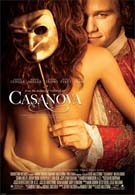Giacomo Casanova, the real Casanova, lived and died in the 18th century. The true love of his life left him after a rocky marriage and he spent much of his life working hard at being miserable. Still, thanks to the exploits described in his autobiography he was hailed as the world’s sexiest man, a title he held until People Magazine declared itself the authority and dubbed Sean Penn for the distinction in 1985. While there’s some debate as to the accuracies of Casanova’s conquests (and People’s choice for his replacement), the legend makes for a pretty good story, especially when you over-embellish it as only Hollywood can.
There are hints of the truth to the story told in Casanova, but the version that unfolds on the screen is a bolder variation on the theme that was just clever enough to leave a smile on my face as I left the theater. In the film, 1700s Venice was aflutter with lust (the truest part of the story), something the Pope and Catholic Church rather frowned upon. Fornication, particularly with nuns, was especially frowned upon and anyone engaging in such activity was quickly rubber-stamped a heretic. As well, women in general were rather limited in the freedoms they were afforded (courtesans excepted of course) and anyone thinking otherwise was quickly rubber-stamped a heretic. As you might imagine, that rubber stamp saw a lot of ink.
Casanova finds himself in the luxurious position of being buddies with the Venetian authorities and is regularly gotten off the hook for his licentious ways. When he finally presses his luck too far our hero is handed an ultimatum: get respectable (i.e. find a wife) or get out of town. Reluctantly he finds the town’s most eligible virgin and sets a date. Things get even trickier when Bishop Pucci (pronounced like the canine nickname), the Pope’s most ruthless Inquisitor, turns up to bring the long arm of the law to Venice. His task is to rid the city of an author who lives in town and has been writing material that bashes the country’s misogynic practices.
The author is in fact a woman, Francesa Bruni, who writes under a masculine pen name to get her works published. She’s also the woman who has captured Casanova’s heart. Never mind that he’s already engaged, Casanova’s real problem is that she hates everything his womanizing stands for. To top it all of she herself is engaged to a man she’s never met, the well-ballasted Paprizzio, the Prince of pork lard. Everyone’s out to find true love, except Pucci who’s just out to vent the fact that he’ll never have any.
There’s a paradoxical elegance to the movie that goes beyond just how easily it mingles fact and fiction. The costumes, sets and language are downright gorgeous, the kind of period fancifulness I would expect from a movie trying to win an armful of Oscars. At the same time the storyline and character interactions are so outlandish and hilariously irreverent that you might expect Harold and Kumar to pop up at any second. The sensation is something like watching Dangerous Beauty mixed with A Knight’s Tale plus a bit of a Disney story added for a slightly magical touch. There are moments when the ludicrous combination falters, like when the entire supporting cast can suddenly sword fight better than the royal guard, but overall it succeeds by taking itself just seriously enough in all the right places.
What truly makes the entire idea work is a cast that knows how to act in period costuming without falling into the trap of “being classical”. Director Lasse Hallström, best known for his work in Chocolat and What’s Eating Gilbert Grape, once again gets the best out of his performers. Heath Ledger is surprisingly adept at carving out a charming yet non-chauvinistic Casanova. He paints the picture of a guy who isn’t just out to get some but really does love women and is himself in search of true love. Ledger’s chemistry with Sienna Miller’s Francesca is believable but not nearly so enjoyable as that between Casanova and his servant Lupo, played by the always hilarious Omid Djalili. Lupo is as much a part of Casanova’s persona as Casanova is and his added dimension is a huge part of why the story is so succesful.
Oliver Platt is wildly entertaining as Francesca’s betrothed. His fat suit and make up, which should win some kind of award for its disturbing reality, is only the first layer to a a performance he obviously relished. Jeremy Irons is, as always, still the villain but this time he gets to play it with some comedic flair. There’s something very wrong about the character’s hair choice (mullet meets powdered wig) and abuse of the royal Papal color of purple (did they even have purple leather back then?) but it all adds up to a very right picture for the story’s buffoonish big bad wolf.
Your Daily Blend of Entertainment News
As something of a movie score buff I have to say that this one is an instant favorite in my book. Despite the silly and often times modernish comedy, the movie never reduces itself to using songs by Queen. Instead it incorporates tons of beautiful classical music to match the stunning period sets and costumes. Alexandre Desplat integrates the music with a bit of original score and themes to tie it all together. I’m always in awe when a composer/director team can seamlessly incorporate appropriate selections by Vivaldi, Telemann and Handel into a movie without seeming pretentious.
On an odd side note, the movie may be the cleanest rated R film I’ve ever seen. There’s no blood, very little violence, zero foul language and less nudity than The Little Mermaid. While there are two very quick sex scenes (again, very little nudity) the movie likely draws its rating from the constant undercurrent of naughtiness and double entendre. In the spirit of letting the audience indulge their brains instead of their eyes the movie is chock full of little bits and pieces of suggestive dialogue as befits the story of the world’s most famous lover. Either that or the producers are trying to ward off the tweens who cut their teeth on A Knight’s Tale. No doubt they would get bored with a movie this intelligent and quickly revert to annoying everyone with their cell phone conversations.
Casanova is not trying to be a serious entry to the historical period genre, nor is it as ridiculous as something like A Knight’s Tale. It finds a pleasant middle ground but cranks up the pace and humor to keep thinks interesting. At times ridiculous, at others touching, it’s an entertaining cinematic frolic that both men and women can enjoy, so long as you don’t mind your history being embellished a bit (OK, a lot) in the name of true love.

